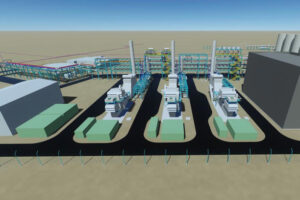UK’s biomass demand is destroying US forests, campaigners say
The UK’s demand for biomass energy is destroying forest ecosystems in the Southeastern United States, environmental campaigners have claimed.
The Natural Resources Defense Council (NRDC), Dogwood Alliance, and the Southern Environmental Law Center have compiled a photographic report which they say documents the destruction caused to hardwood forests by biomass sourcing for Enviva, the world’s largest producer of wood pellets.
Enviva’s pellets are used to supply European utilities such as Drax Power in the UK, which runs Europe’s biggest biomass-fuelled power station, Drax power station, and receives substantial subsidies from the UK government.
The campaigners have argued that the UK and Drax’s reliance on ‘unsustainable’ biomass sourcing is not just damaging native forests but is also exacerbating climate change.
‘There’s nothing green about devastating these stunning forests and then shipping the wood across the ocean to be burned in dirty power plants,’ said Sasha Stashwick, senior advocate at the NRDC.
‘This investigation is a direct challenge to the UK government’s policy of continuing to prop up Drax.’
The UK’s apparent involvement in depleting global biodiversity comes as a concern, as the UN’s Global Assessment report published last month revealed that a million animal and plant species are now at threat from extinction, partly due to human activities such as depleting forests.
The NRDC says that hardwood forests in the southeastern US are being clean cut, with whole trees and other large-diameter wood being sent to industrial mills to be manufactured into wood pellets.
The environmental group claims that forests in the region are being logged at four times the rate as those in the Amazon, while wood pellet mills in the region often release air pollution above legal levels.
According to the group, the biomass sourcing practices currently being used are permitted under UK regulations and Drax’s sustainability standards.
The campaigners have called for the UK to end its subsidies for biomass, saying that policy-makers should redirect their investment to other low-carbon energy sources such as energy efficiency, solar and wind.
‘The UK’s dependence on biomass puts some of the world’s most ecologically valuable forests at risk,’ said Rita Frost, campaigns director at Dogwood Alliance, which conducted the investigation.
‘If the UK is going to live up to its promises to address our climate crisis, it must cut harmful carbon emissions, not forests.’
Late last year, the UK’s Committee on Climate Change said in a report that biomass can play an important role in meeting UK climate targets, but only if it is governed more strictly to ensure sustainable supplies.
The CCC warned that biomass harvested and used from forests can only be considered low-carbon if it protects or enhances biodiversity and if the forests are sustainably managed.
A Drax spokesperson disputed the claims made by the NRDC, saying that Drax’s biomass comes from sustainable working forests with its suppliers regularly audited to make sure they comply with UK regulations.
The spokesperson said: ‘Previous editions of this publication have not been found to be credible and having checked the claims made this time, we have found them not to be true.
‘We hold our suppliers to the highest standards when it comes to sustainability. Biomass plays a critical role in decarbonising the UK’s economy.’
Enviva also dismissed the NRDC’s report as misleading, calling the assertions made in the report ‘outdated and outright false’.
The company said that the tract mentioned in this year’s NRDC report is part of the working forest in the US Southeast, not a bottomland hardwood forest. It added that the land is managed for timber production and will regenerate as forest.
‘Not all of the material from the tract came to Enviva – we took the low-quality wood that was generated as a by-product of this traditional sawtimber harvest,’ Enviva said. ‘Our purchase comprised about 30% of the total volume harvested.
‘The remaining 70% was higher-quality wood [that] went to other forest product markets, as is typical of most tracts we source from.’
Image credit: Natural Resources Defense Council (NRDC)
















NRDC and Dogwood get so many things wrong that I’m surprised folks still give them any credit. I guess the squeakiest wheel gets the most grease.
The biggest thing that bothers me about the statement comparing forest of the US South vs the Amazon forest is that most landowners manage them for financial return and are tree farms. Most of the planted trees were planted with an eye on cutting them at some point in the future. There are no mature virgin forest left in the Southeast. However, most of the Amazon is virgin and the cutting there is so that they can increase cow grazing pasture and other carbon heavy activities.
US South forest vs Amazonian forest is not an apples to apples comparison. These folks end goal is to stop harvesting timber all together. You know what will happen when landowners will do when they can’t manage timber for a profit (most times they just break-even)? They will turn to cow pastures, chicken farms and row agriculture (where possible)… Tell me how good grass for cows stores carbon?
Looking at the panphlet with all the years of photos of where they tracked log trucks, they are all dated to be captured in the wettest times of year. Come back in August when it hasn’t rained in two months and it will look completely different. Every forester worth their marbles will tell you this. In addition to this, all the hardwood logs on all those truck are the definition of pulpwood. There is nothing better that can be done with those sticks. A hardwood sawmill or export log facility will pay so much more money than Enviva will for logs that it is in the landowners, loggers and wood dealers interest to properly sort out logs.